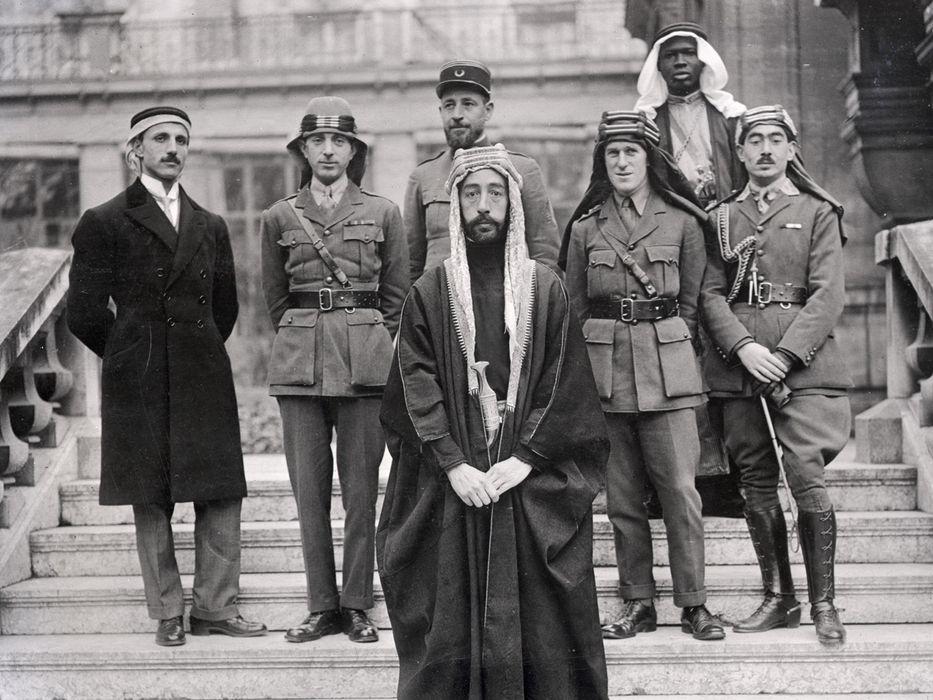Could a king be the thing to unify a crumbling Iraq?
Then-Prince Faisal stands with his delegation at the Versailles peace conference after World War I in France. Faisal went on to become king of Iraq.
After decades of conflict, is there a leader that could unify Iraq? It was once thought that Prime Minister Nouri Al-Maliki was the man for the job, but he continues to stir up controversy, even as he leaves power.
Haider Al-Abadi has been nominated as the country's next prime minister, but early doubts are emerging over whether he has the force of character to stop the country from pulling itself further apart. The candidates from the Dawa Party have so far been the only leaders in Iraq post Saddam Hussein.
But former Iraqi Minister of Trade, Defense, and Finance Ali Allawi reminds us that before Saddam Hussein, Iraq had a monarchy. Is it time to take a royal route back to unity in this divided country? Allawi, the author of "Faisal I of Iraq," says a monarchy may be a long-shot, but it's hardly a far-fetched idea.
"When Iraq was first founded in 1921, it followed a monarchical system," Allawi explains. "It seemed to provide the right mix of political cover to create an element of stability in a country that has a very varied population. The monarch that we had was not indigenous — he was from the Hejaz [region] in what is now Saudi Arabia. But he came with a long pedigree, and was a person who could unite various, disparate groups in a form of determined, but moderate, patriotism."
Though Iraq had a strong start with King Faisal, a member of the Hashemite family, the monarchy did not last for more than 30 years, and Allawi concedes that it would be very difficult to recreate the conditions of 1921.
"There are quite a few people who could be considered legitimate heirs," says Allawi. "The most important one — and he in fact went back to Iraq after 2003 — his name is Sharif Ali Bin al-Hussein. His grandfather was King Ali of the Hejaz, so Faisal was his great uncle. But I'm afraid the monarchical system in Iraq didn't get much traction after 2003, for a variety of reasons."
But Allawai believes a monarchy is one of the few formulas that could work in Iraq. He contends it could also unite both Sunnis and Shiites.
"Faisal I and his descendants, including Sharif Ali and others, they bring to the equation some very, very important advantages," he says. "One of them is that they are descendants of the prophet Muhammad, and therefore have great religious legitimacy. Secondly, they have been rulers and custodians over the shrines in the Hejaz of Mecca and Medina for nearly 1,000 years, before this was taken over from them by the Saudis. They are probably the most noble family in the Arab world."
Allawai says that Sharif Ali Bin al-Hussein and his family already have roots in the country and practice a very open and inclusive form of Islam.
"He can transcend the differences, and act as a focal point for groups that would normally not be able to co-exist," says Allawai. "King Faisal I was able to do that, [but] a lot of it depends on the quality of the individual. We have the possibilities in Iraq of forming a monarchical system that can act as a kind of magnet for all of the various groups because it does not really belong to each individual, and therefore cannot be seen to be partial."
Coalescing support around a monarchical system would be the key to its success, says Allawai. But that idea is easier said than done.
"If you're going to be able to produce a king, there has to be some kind of groundswell of support for such a person, and it has to develop and evolve," he says. "It could have happened, and it could still happen. But as things stand right now, it seems to be a long shot."
This story is based on an interview from PRI's The Takeaway, a public radio program that invites you to be part of the American conversation.
